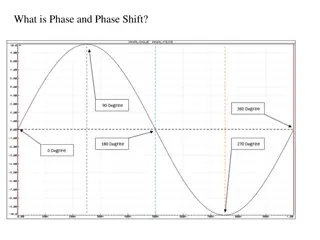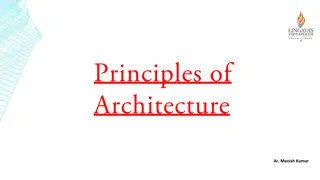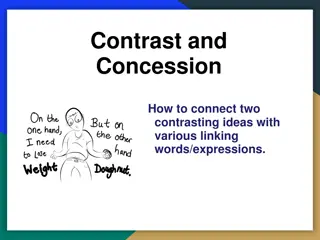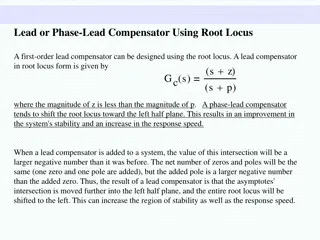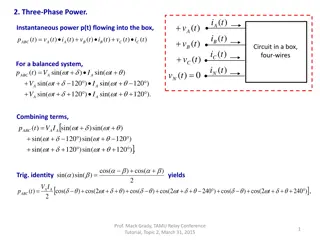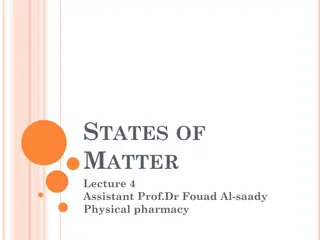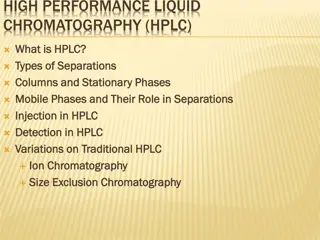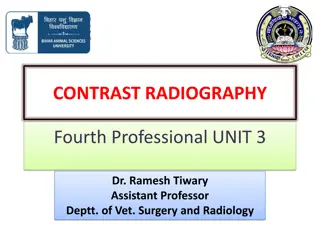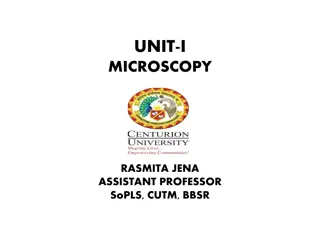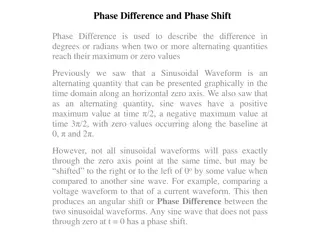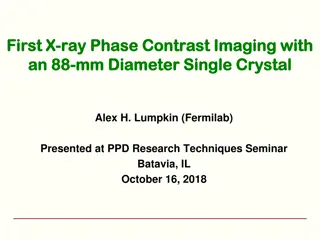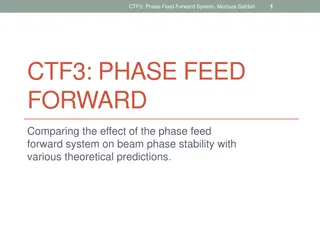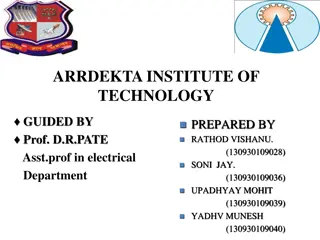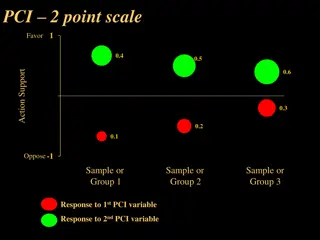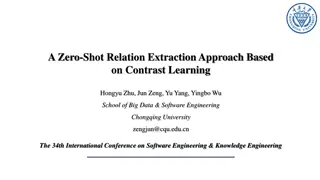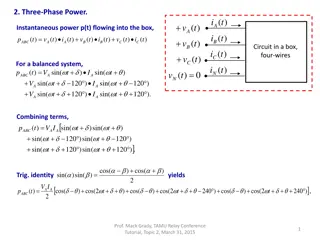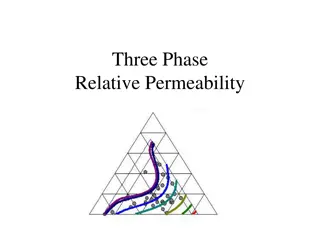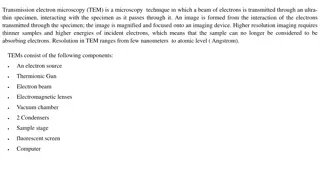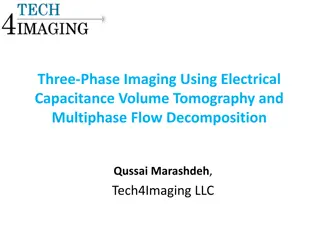The Role of Inorganic Nitrate in Preventing Contrast-Induced Nephropathy
Contrast-Induced Nephropathy (CIN) poses risks to patients undergoing angiography. This study evaluates the potential benefits of dietary inorganic nitrate in preventing CIN and its mechanisms. Results show promising renoprotective effects, highlighting a potential preventive approach for at-risk pa
1 views • 25 slides
Understanding RC Phase Shift Oscillators
Dive into the world of RC phase shift oscillators, exploring the concepts of phase and phase shift in electronic circuits. Learn how cascading RC networks can achieve specific phase shifts, the role of impedance, and the practical applications of RC feedback networks in oscillator circuits. Discover
1 views • 18 slides
Principles of Architecture: Unity, Contrast, Mass Composition
Explore the fundamental principles of architecture focusing on unity, contrast, and mass composition. Unity emphasizes harmony among building elements, contrast adds interest without disrupting unity, and mass composition involves arranging shapes in a harmonious way. Proportion and scale play key r
0 views • 24 slides
Connecting Contrasting Ideas: Linking Words and Expressions
Explore how to connect contrasting ideas using conjunctions, adverbials, and prepositions for both neutral contrasts and unexpected results. Learn the nuances of while/whereas, on the other hand/in contrast, in contrast with/to, unlike, and employing but, although, even though, yet, however, neverth
6 views • 11 slides
Voice Quality in Polish Laryngeal Contrast
Examining the role of voice quality in the laryngeal contrast of Polish, this research delves into the phonological complexities and perceptions of voice contrasts in the Polish language. It compares traditional binary approaches to newer unary approaches, discussing implications and challenges in r
0 views • 28 slides
Understanding Lead and Phase-Lead Compensators
Lead and Phase-Lead compensators play a crucial role in improving system stability and response speed. By using the root locus and frequency response methods, these compensators shift the root locus toward the left half-plane, adding positive phase over the frequency range. This leads to increased s
0 views • 16 slides
Understanding the Three Stages of Project Life Cycle
The project life cycle consists of three key stages: pre-investment phase, construction phase, and normalisation phase. The pre-investment phase involves objective formulation, demand forecasting, and cost-benefit analysis. The construction phase focuses on building project infrastructure and invest
1 views • 5 slides
Understanding Image Histograms and Modifications
Image histograms provide valuable insights into the nature of images, with characteristics like width, skewness, and peaks revealing information about contrast, brightness, and objects within. Different types of histograms indicate varying image attributes, aiding in tasks like threshold parameter s
1 views • 13 slides
Understanding Three-Phase Power Systems and Instantaneous Power Flow
This detailed content delves into three-phase power systems, analyzing instantaneous power flow, balanced circuits, and trigonometric calculations. It explores the concept of constant three-phase power and provides insights into the analogy of a piston engine with infinite cylinders. The data includ
2 views • 9 slides
Understanding Phase Equilibria in Physical Pharmacy
Delve into the complexities of states of matter, phase equilibria, and the phase rule as explained by Assistant Prof. Dr. Fouad Al-saady in the context of physical pharmacy. Learn about phase definitions, phases in different systems, and examples illustrating phase differentiation in various substan
0 views • 22 slides
Phase 1 Phonics: Developing Early Listening and Speaking Skills
Phase 1 Phonics, the initial stage of Letters and Sounds, focuses on enhancing children's speaking and listening abilities to prepare them for phonics work in Phase 2. This phase emphasizes tuning in to sounds, listening and remembering sounds, and talking about sounds through various activities des
3 views • 17 slides
Understanding Poly Phase Induction Motor Construction
An induction motor is comprised of a stator and rotor, with the stator featuring a 3-phase winding fed from a 3-phase supply. The rotor comes in two types - squirrel-cage and phase wound. The squirrel-cage rotor consists of heavy bars tightly pressed on the shaft, while the phase wound rotor has a 3
0 views • 47 slides
Understanding Adverb Clauses: Usage and Examples
Adverb clauses help to establish relationships between ideas by indicating time, cause and effect, contrast, and condition. They are dependent clauses that must be connected to a main clause. Punctuation plays a key role in distinguishing between adverb clauses that precede or follow a main clause.
0 views • 43 slides
An Overview of High Performance Liquid Chromatography (HPLC)
High Performance Liquid Chromatography (HPLC) is a powerful analytical technique used for separating and identifying compounds in a mixture. It involves a mobile phase and a stationary phase to achieve separation based on different physicochemical properties. The mobile phase plays a crucial role in
0 views • 20 slides
Understanding Contrast Radiography in Veterinary Surgery and Radiology
Contrast radiography is a crucial technique in veterinary medicine that involves using contrast media to enhance visualization of organs and lesions. Different types of contrast media, positive and negative, are used to alter tissue radio density for better demarcation. Barium and iodine compounds a
0 views • 14 slides
Understanding Phase Contrast Microscopy: A Revolutionary Tool in Cell Observation
Phase contrast microscopy, invented by Frits Zernike, revolutionized cell observation by utilizing tiny phase changes in light rays to create contrast in living cells. This technique exploits differences in refractive indices to enhance visibility without staining cells, offering a new perspective i
0 views • 27 slides
Understanding the Phase Rule in Physical Pharmacy: Two Component Systems and Equilibrium Phases
The Phase Rule is essential in determining the state of a system based on components and phases. This study explores two-component systems in physical pharmacy, illustrating miscibility behaviors and equilibrium phases through diagrams and explanations. Understanding binodal curves, tie lines, and t
0 views • 12 slides
Intermodal Contrast: A Narrative Device in Film
Exploring the use of intermodal contrast as a narrative device in films, this study delves into the integration of semiotic modes to create meaning. Various examples from films like Gattaca are analyzed to showcase how different modes interact to convey nuanced messages and enhance storytelling. By
0 views • 22 slides
Understanding Phase Difference and Phase Shift in Sinusoidal Waveforms
Phase difference and phase shift describe the angular displacement of sinusoidal waveforms in degrees or radians. These concepts are crucial in analyzing the relationship between alternating quantities such as voltage and current. The phase angle determines the shift of a waveform along the horizont
1 views • 26 slides
Understanding Human Contrast Threshold and Astronomical Visibility
Delve into the practical implications of human contrast threshold and astronomical visibility to explore the faintest stars visible to the naked eye or through telescopes under various lighting conditions. This study aids in comprehending the essence of dark skies, the historical evolution of light
0 views • 28 slides
Advances in X-ray Phase Contrast Imaging with Single Crystal Scintillators
This presentation discusses the use of single-crystal scintillators in X-ray imaging systems to optimize spatial resolution and efficiency. By utilizing modified FO plates and single crystals, a new paradigm has been introduced to enhance the point-spread function while maintaining or improving effi
0 views • 43 slides
Academic Writing Assignment: Compare/Contrast Essay Guidelines
Explore the guidelines for an academic writing assignment that involves researching and writing a compare/contrast essay on international topics. Discover the importance of transition signals for coherence and examples to improve your writing. Remember to conduct proper research before beginning you
0 views • 46 slides
Training Phase in Teen Challenge Residential Program
The training phase in the Teen Challenge residential program is a crucial period focused on developing drug-free lifestyles, deepening relationships with Jesus, and creating personal recovery and exit plans. Participants follow a structured daily schedule that includes devotions, classes, work progr
0 views • 12 slides
Phase Feed Forward System: Analyzing Beam Phase Stability and Theoretical Predictions
Exploring the impact of phase feed forward systems on beam phase stability through comparisons with theoretical predictions and simulations of increasing limitations. Testing the accuracy of theoretical gain factors and assessing performance using global gain factors. Utilizing specific data files a
0 views • 58 slides
Understanding Three Phase Transformers and Connections in Power Systems
Exploring the fundamentals of three-phase transformers and their connections in power systems, such as star-star, delta-delta, star-delta, and delta-star. Learn about advantages, disadvantages, and applications of these configurations in balanced and unbalanced loads. Discover how three single-phase
0 views • 19 slides
Contrast and Development in "Men Should Weep" Act Three
Act Three of "Men Should Weep" by Ena Lamont Stewart portrays a contrast in atmosphere from the start of the act, characterized by a cheerier and more positive ambiance. It delves into complex family dynamics, plot strands, and character developments that culminate in a climactic resolution, offerin
0 views • 39 slides
Comprehensive Overview of Point Contrast Interview Scales
Explore a detailed comparison of various Point Contrast Interview scales ranging from 2-point to 9-point scales. Each scale reflects different levels of favor, action support, uncertainty, and opposition, along with sample responses. The scales provide a structured framework for assessing opinions a
0 views • 8 slides
Zero-Shot Relation Extraction Based on Contrast Learning
This paper presents a zero-shot relation extraction approach based on contrast learning, aiming to improve the efficiency of relation extraction tasks. The methodology involves utilizing a knowledge graph to extract relational triplets and leveraging zero-shot learning to automate the process. The s
0 views • 21 slides
Optimizing Dementia Care Pathways: A Case Study of Tom & Barbara
Tom's journey through dementia highlights the stark contrast between sub-optimal and optimal pathways. Delayed diagnosis, hospital admissions, and caregiver strain characterize the sub-optimal route, leading to poor outcomes and high costs. In contrast, early intervention, comprehensive support, and
0 views • 7 slides
Understanding Design Principles: Contrast, Repetition, Alignment, Proximity, Color Theory
Explore the significance of design principles such as contrast, repetition, alignment, proximity, and color theory in creating visually appealing and effective designs. Learn how contrast plays a vital role in guiding the viewer's attention and enhancing visual interest through various techniques li
0 views • 30 slides
Understanding Nutritional Treatment Phases in Pediatric Malnutrition
This session covers the different phases of nutritional treatment in pediatric malnutrition programs, focusing on objectives, specifics, and criteria for transitioning between phases. An illustrative case of Annika, a 3-year-old in the Transition Phase, is provided for practical application and unde
0 views • 5 slides
Understanding Barium Meal Radiological Study
Barium meal is a radiological study of the upper gastrointestinal tract, including the esophagus, stomach, duodenum, and proximal jejunum. It helps diagnose various conditions such as peptic ulcers, cancers, and gastrointestinal obstructions. The procedure involves oral administration of barium cont
0 views • 11 slides
Understanding Three-Phase Power Systems
This content discusses three-phase power systems, including instantaneous power flow, balanced systems, and trigonometric identities. It delves into the concept of smooth running machines in relation to three-phase power, analyzing the constant nature of instantaneous power. The analogies to a pisto
0 views • 7 slides
Understanding Three-Phase Relative Permeabilities in Reservoir Engineering
Explore the application, correlations, and traditional assumptions of three-phase relative permeabilities in reservoir engineering. Learn about saturation-dependencies, occupancy models, and the challenges of measuring three-phase relative permeabilities. Discover how to calculate three-phase permea
0 views • 14 slides
Understanding Microbial Growth: Phases and Dynamics
Microbial growth is defined as an increase in cellular constituents leading to a rise in microorganism size or population. The growth of bacterial cells is characterized by distinct phases such as lag phase and exponential phase. During the lag phase, cells are synthesizing new components before div
0 views • 21 slides
Understanding Bacterial Growth and Nutritional Requirements
Bacterial growth involves processes like binary fission, exponential phase, and stationary phase. Factors influencing growth include nutrient availability, oxygen levels, and toxic waste accumulation. Lag phase precedes exponential growth, where cells prepare for division. Stationary phase occurs wh
0 views • 11 slides
Phase II Trial Design in Oncology Drug Development by Wendy R. Parulekar, MD, FRCP
This presentation covers the pivotal role of Phase II trials in oncology drug development, emphasizing the importance of preliminary clinical efficacy screening, adverse event profiling, mechanism of action understanding, and target population definition. It discusses various Phase II trial designs,
0 views • 76 slides
Understanding Transmission Electron Microscopy (TEM)
Transmission Electron Microscopy (TEM) is a powerful microscopy technique that uses a beam of electrons to create high-resolution images of ultra-thin specimens. It provides detailed information on topography, morphology, composition, and crystalline structure. Sample preparation for TEM is crucial,
0 views • 10 slides
Advanced Imaging Techniques for Three-Phase Flows in Reactor Systems
Gas-liquid-solid reactor systems require advanced measuring techniques to understand complex three-phase flows. Multi-Phase Flow Decomposition using Electrical Capacitance Volume Tomography (ECVT) offers innovative solutions for visualizing and quantifying phase hold-up distributions and dynamic cha
0 views • 17 slides
Moving to the Design Phase: Feasibility Phase Checklist
The transition requirements for moving to the Design Phase include the Water Fund being deemed feasible, resources committed for design, and a formal decision made. The Feasibility Phase Checklist covers governance, science, finance, implementation, and communications aspects. The high-level action
0 views • 4 slides

